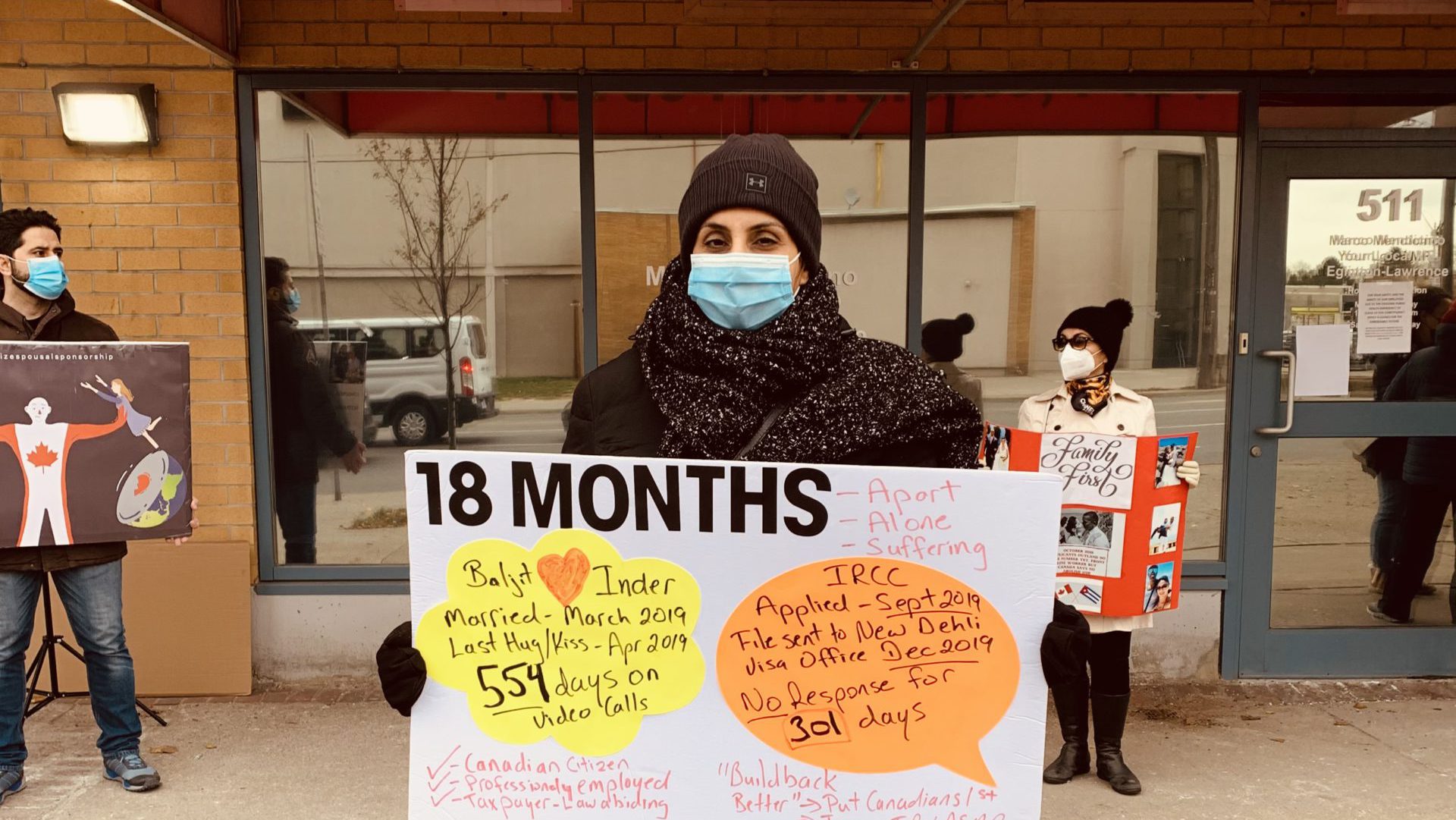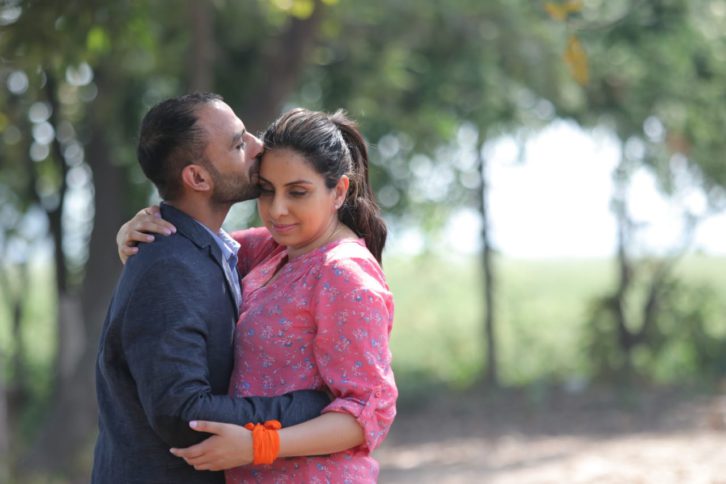COVID-19 exposing cracks in Canada’s immigration system

caption
Inder Kaur at a protest outside the minister of immigration's officeCanadians who have spousal sponsorship applications in process are facing increased delays due to COVID-19
Editor's Note
This story is part of a series prepared by King's one-year MJ students on the COVID-19 pandemic.
When Inder Kaur said goodbye to her newlywed husband in April 2019 she never expected they would spend the first year and a half of their marriage separated.
Kaur, and Baljit Singh, got married in India. In September 2019, five months after the wedding, Kaur submitted a spousal sponsorship application to bring her husband to Canada. She is a Canadian citizen. More than 16 months later, they are still waiting for it to be approved.
Like so many things, the processing time for immigration applications has been affected by the COVID-19 pandemic.
According to numbers obtained from Immigration, Refugee and Citizenship Canada by the NDP’s immigration critic, when the pandemic hit in March 2020 the department’s workforce shrank by 62 per cent.
Lee Cohen, an immigration lawyer in Halifax, said at the outset of the pandemic people who needed or wanted to come to Canada did not stop applying, but those processing their applications did stop working.
“What we have now, because of the pandemic, is an immigration system that in almost all sectors is backlogged,” he said.
According to open data from the immigration department, in April 2019 there were 26,900 admissions of permanent residency in Canada; in April 2020 there were 4,135. That was a drop of 85 per cent.
The number of admissions has started to climb again since April, but at the end of 2020 it was still about 10,000 less than what it was in 2019.
Cohen said the immigration system started to fire up again in June of last year but has been doing so in an unpredictable way.
He said while some applications are moving quickly, others remain stuck in the system.
Departmental data obtained by the Conservative immigration critic showed that as of November 5, 2020, there were more than 50,000 spousal sponsorship applications in the backlog.
Other applications hadn’t even made it into this official count.
From January 1 to March 15, the immigration department received more than 15,000 applications for family sponsorship. In the following five-month period, once the pandemic hit, from March 16 to August 31, only 163 applications were officially received.
Jenny Kwan, the NDP immigration critic and MP for Vancouver East, said this is because a lot of applications are still sitting in mail rooms.
“For close to six months, applications basically went into the mail room and just sat there and collected dust,” said Kwan.
“People really have no ability to see where their application is at, or inquire about it.”
In an email statement the department said it is continuing to work towards improving and updating its digital infrastructure and web site “with a goal of giving clients access to more timely and relevant information on their application status.”
The department also stated, in a September 2020 news release, that it plans to accelerate, prioritize and finalize 6,000 spousal applications each month from October until December. It also committed to increasing decision makers on spousal sponsorship applications in Canada by 66 per cent.
Kwan said despite government claims such as this made, people waiting for applications to be processed are not seeing these impacts. She said her office and social media continue to be overwhelmed with cries for help from people.
With nowhere else to turn, many applicants have started forming advocacy groups.
Kwan said people often think they are alone, but these groups have shown them there are thousands of other people who are in the same boat.
One of these groups is Spousal Sponsorship Advocates, which formed in May, and now has over 5,000 members on Facebook. Kaur attended a protest the group organized outside Immigration Minister Marco Mendicino’s office in Toronto.
She said this protest was the first time she met other people and listened to their stories.
“It was devastating,” said Kaur. “Each story I heard was worse than the last.”
She said she met a woman who’s been waiting for her application to be finalized for seven years, suggesting problems go much deeper than just the pandemic.
“It’s not just the one story you saw in the news; it’s thousands of stories and they’re all the same,” said Kaur . “There’s a problem with the system.”
Elizabeth Long, an immigration lawyer in Toronto, said the pandemic is highlighting flaws and inequalities that have always existed in Canada’s immigration system.
Processing times have always been long for spousal sponsorship applications, but with the border closures and travel restrictions people are unable to visit their family while they wait.
Kaur planned to visit her husband in March 2020 while waiting for their application to be processed, but she had to cancel her trip when the pandemic hit.
“I know that people got around this whole system, or tolerated this system, by travelling to their spouses and taking on that extra expense,” said Kaur. “But now with the border restrictions we can’t even do that. We’re literally stuck.”
Without these visits, a year-long wait suddenly feels much longer.
Kaur’s husband applied for a temporary visitor visa, but she’s not confident he will be approved.
In December 2020 the immigration department website showed the processing time for someone to get a visitor visa from India was 250 days; in 2019, the average wait time for a visitor visa from India was 21 days.

caption
The last time Kaur saw her husband, Baljit Singh, in India in April 2019Long said there’s a huge difference right now between people trying to come to Canada from a visa-required country such as India versus those from a visa-exempt country.
She said people who have spouses in Canada are often denied visitor visas as a result of section 179b in Canada’s Immigration and Refugee Protection Regulations, which states someone can only be issued a temporary resident visa if an officer believes they will leave Canada.
Long said officers often deny visitor visas to people with family in Canada because they believe the applicant’s ties to Canada are too strong and they will overstay their visa.
“It’s not about your own personal circumstances at all. It’s just about the passport that you hold,” said Long . “That’s absolutely unfair, and it also really prejudices.”
Long believes inequality in the system is just one of the problems that pandemic has brought to the surface; another is the lack of communication.
Long said not knowing the outcome of their immigration status is one of the most stressful things someone can go through, especially during a pandemic.
“Immigration is one of those systems that affect a person to their core, their ability to be in this country, to be with family, to work, to study,” said Long. “So, it can’t be that we have this system that just does not listen.”
Kaur’s last update from the immigration department was more than a year ago.
“It’s just this big wait in the dark, with nothing, no information,” she said.
Kaur is unsure how much longer she’ll be able to wait, and she’s thinking about asking for a leave from work to go to India, even though COVID and potential dangers travelling alone mean it would be risky.
She said the months of living in uncertainty have begun to affect her mental health.
“I’ll be driving, and I’ll just start crying because it’s always on my mind,” said Kaur .
“There’s no consideration; there’s no compassion; there’s no pathway.”
About the author
Ellen Riopelle
Ellen is a journalist currently living in Halifax. She has a penchant for travelling, hammocks, craft beer and good stories.

N
Nadine
P
Pankaj vaza
L
Laurene Cascayan
G
GK
I
Ishan M